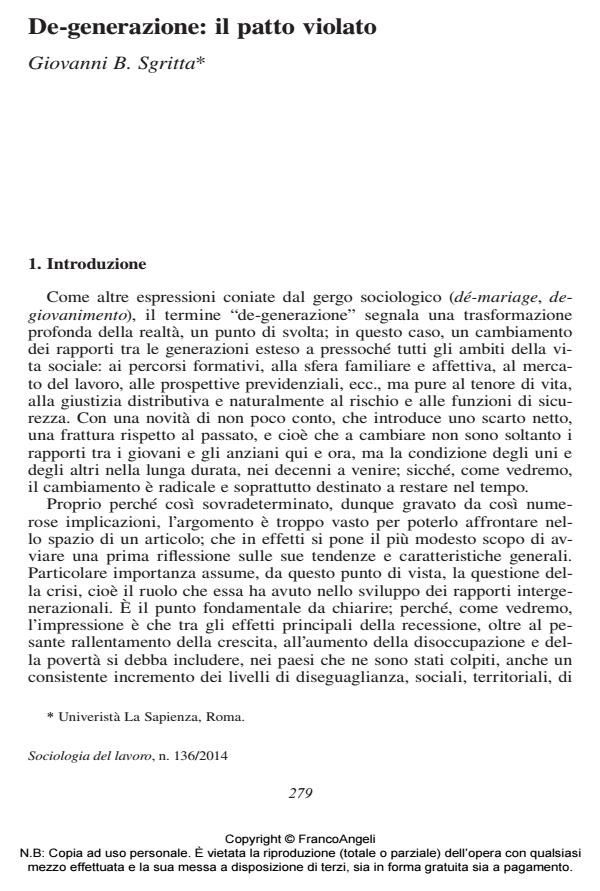De-generation: the violated pact
Journal title SOCIOLOGIA DEL LAVORO
Author/s Giovanni B. Sgritta
Publishing Year 2014 Issue 2014/136
Language Italian Pages 16 P. 279-294 File size 118 KB
DOI 10.3280/SL2014-136015
DOI is like a bar code for intellectual property: to have more infomation
click here
Below, you can see the article first page
If you want to buy this article in PDF format, you can do it, following the instructions to buy download credits

FrancoAngeli is member of Publishers International Linking Association, Inc (PILA), a not-for-profit association which run the CrossRef service enabling links to and from online scholarly content.
The term "de-generation" points at the beginning of a dramatic transformation in the relationship between the generations. On the basis of recent literature, the A. examines the demographic, social and economic changes which in the last decades have invested almost all areas of the social condition of young people: education, the family and the emotional sphere, the labor market, the prospects for social security, the distributive justice etc. In most part of developed societies, the condition of the young, compared to the remaining age classes, presents at least three invariant negative records: the lowest intensity of work, the highest risk of poverty and the greater material deprivation. With the recent economic crisis this process of "de-generation" has further deteriorated. The biggest part of the burden has been carried by the young. The rise in unemployment and poverty is likely to mortgaging heavely the living strandard of future generations, young and elderly alike.
Keywords: De-generation, intergenerational relations, distributive justice, demographic change, recession
- Young adult migrants’ representation of ethnic, gender and generational disadvantage in Italy Francesca Alice Vianello, Angela M. Toffanin, in Ethnic and Racial Studies /2021 pp.154
DOI: 10.1080/01419870.2020.1726429 - Affecting and spatializing future(s) among young entrepreneurs in the South Italy Letteria G. Fassari, Massimo Blandini, in Futures 103342/2024 pp.103342
DOI: 10.1016/j.futures.2024.103342 - What does being an adult mean? Comparing young people’s and adults’ representations of adulthood Ilaria Pitti, in Journal of Youth Studies /2017 pp.1225
DOI: 10.1080/13676261.2017.1317336 - Some Voices from Italian Youth on Well-Being: How to Cope with Job Insecurity? Rosy Musumeci, Chiara Ghislieri, in Social Sciences /2020 pp.58
DOI: 10.3390/socsci9040058 - Young People Re-Generating Politics in Times of Crises Nicola De Luigi, Alessandro Martelli, Ilaria Pitti, pp.253 (ISBN:978-3-319-58249-8)
- Tra lavoro e partecipazione. Tracce di protagonismo giovanile Alessandro Martelli, Paolo Zurla, in SOCIOLOGIA E RICERCA SOCIALE 118/2019 pp.124
DOI: 10.3280/SR2018-117008 - Neoliberalism, Austerity, and the Moral Economies of Young People’s Health and Well-being Giuseppina Cersosimo, Maurizio Merico, pp.141 (ISBN:978-1-137-58265-2)
Giovanni B. Sgritta, De-generazione: il patto violato in "SOCIOLOGIA DEL LAVORO " 136/2014, pp 279-294, DOI: 10.3280/SL2014-136015